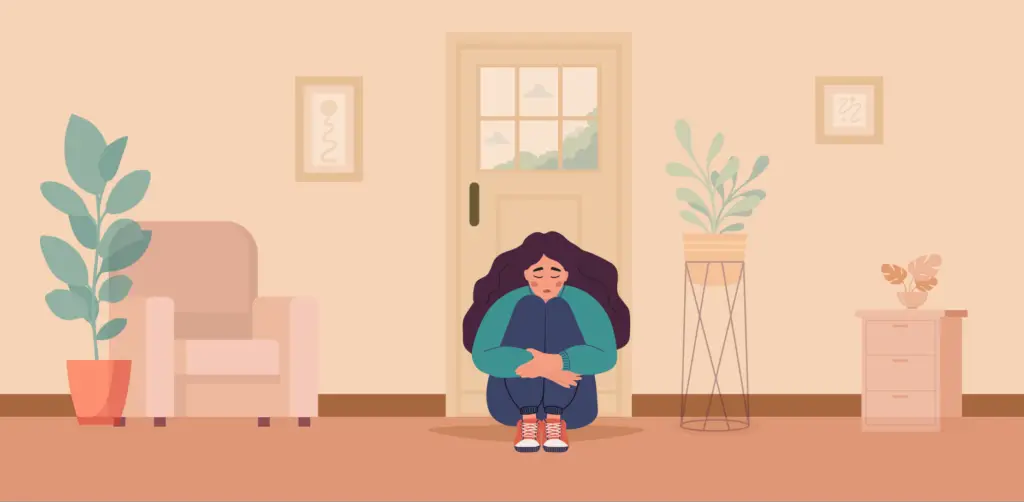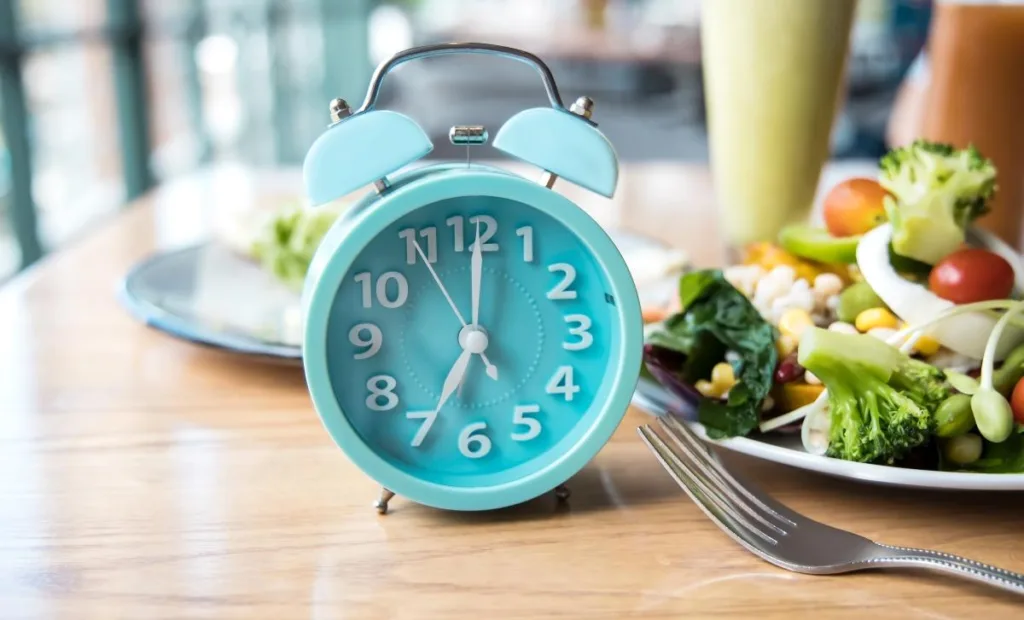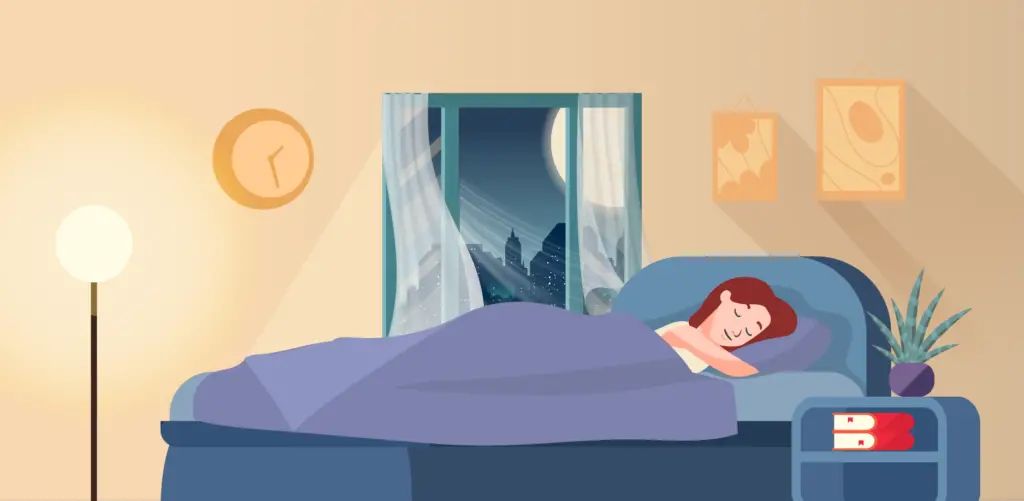Table of Contents
As the clock ticks past midnight, you find yourself wide awake, a familiar refrain playing in your mind: “I want to sleep, but my brain won’t let me.” This struggle of racing thoughts at night is more common than you might think.
In our journey to unravel the mystery of a racing mind at night, we’ll explore everything from the impact of jet lag to the unsuspected influences of caffeine and medication. We will also look into solutions on how to stop racing thoughts at night and help you regain your path back to peaceful sleep.
“I want to sleep but my brain won’t let me”: Why does this happen?
Are you tossing and turning, wrestling with the question, “Why is my body not letting me sleep”? Or perhaps you’re lying there, wondering, “Why does my body not let me sleep,” as a whirlwind of thoughts races through your mind.
If the phrase “can’t stop thinking when trying to sleep” resonates with you, you’re not alone. Here, we’ll discuss four hidden reasons behind our sleepless nights.
Stress and anxiety
If you’re asking yourself, “Why does my body not let me sleep?”, it could be due to how you react to stress and anxiety.
Cortisol, often dubbed the “stress hormone,” has a day job and a night shift. During the day, it keeps you alert and energetic. But at night, it’s supposed to take a back seat to melatonin, the hormone that helps you sleep.
When stress strikes, cortisol levels can stay high, keeping you wide awake. Our hormones exist in delicate balance with each other, so when one is out of sync, it affects the balance of others, which can affect our sleep.
However, not everyone is affected by stress in the same way. Some people can snooze easily (low sleep reactivity), while others wake up and can’t go back to sleep (high sleep reactivity). Research demonstrates how stress and one’s relationship to stress directly impacts sleep quality. If you’re often stressed, your sleep might take the first hit. High sleep reactivity reflects a higher level of cognitive intrusion, like rumination with stress, and can make one more susceptible to developing insomnia (1).
Circadian Rhythm Misalignment(Jet Lag)
Jet lag – feeling like a zombie at a board meeting or wide awake at 3 am. Let’s unpack how this byproduct of how travel affects our sleep.
Your circadian rhythm is like an internal clock, orchestrating your 24-hour sleep-wake cycle, but sometimes, it gets out of tune, especially when you travel across time zones or work irregular shifts.
This happens when you travel to different time zones, and your body’s clock is still set to your original time zone (2). You might find yourself struggling to stay awake during a sunny Paris afternoon or staring at the ceiling in the dead of night in Tokyo.
If you’re hopping over six or more time zones, expect about 4-6 days to recalibrate your internal clock (3).
If you don’t travel across time zones, you can still experience circadian rhythm misalignment if your work schedule is different from the typical day-night cycle. This misalignment is known as “social jet lag” or delayed sleep phase syndrome, where your natural sleep-wake cycle doesn’t match your social or work obligations.
Nutrition & sunlight
A way to balance your body’s internal clock is to get sunlight upon waking in the morning. Even better would be a brisk walk outside in the sun to obtain the active form of Vitamin D, which is significant in regulating mood and hormonal health. Ensuring you’re consuming a balanced diet of nutrient-dense foods is also important in combating sleep.
A study found that increased consumption of foods containing phytonutrients, tryptophan, a precursor to serotonin and melatonin, was associated with improved sleep outcomes in participants (4). It is also important to adequately hydrate and support your microbiome health with nutrition and mind-body modalities to support stress. The diversity and quality of our microbiome is a key player in regulating sleep (5).
Caffeine
A cup of coffee can be the savior of early mornings and late-night deadlines. But did you know that your beloved espresso could be why you have a racing mind when trying to sleep?
Caffeine is like an energetic friend who keeps nudging you to stay awake, even when you desperately want to sleep. A study revealed that caffeine taken 6 hours before bedtime can significantly disrupt sleep, leading to a game of midnight ceiling-staring (6).
Another analysis found that caffeine increases light sleep and decreases deep sleep, compromising sleep quality (7).
Here’s where it gets personal – not everyone reacts to caffeine similarly. Research suggests that how caffeine affects sleep might depend on how much sleep you usually get. If you’re a short sleeper, that evening cup might hit you harder (8).
Medication
From headache pills to prescriptions for more chronic conditions, sometimes the medications intended to aid us can quietly disturb our sleep. Medications that can potentially lead to insomnia include:
- Antidepressants
- Antiseizure drugs
- Asthma treatments
- Over-the-counter cold or allergy medicines
- Steroids
- Thyroid hormone preparations
These drugs can alter the delicate balance of neurotransmitters or hormones and interfere with natural sleep-wake cycles or stimulate parts of the brain or body, making relaxation and sleep elusive.
A study using the representative samples of the National Health and Nutrition Examination Survey (NHANES) reveals a striking trend – an alarming increase in the use of medications with potential insomnia side effects (9).
From 1999 to 2016, there was a whopping 66% rise in the use of one such medication and a staggering 164% increase for those using two or more.
Users of these medications report more sleep issues, such as trouble falling or staying asleep and feeling sleepy during the day.
How to calm racing mind at night: Practical strategies
The most practical strategy to stop your mind from racing at night is to create a relaxing environment for your sleep.
According to Heather Turgeon MFT and Julie Wright MFT in their book “Generation Sleepless,” the best sleep space is like a quiet, dark cave. Let’s start creating this peaceful sleep space together, where every night is a chance for good, refreshing sleep.
Light
When it comes to a good night’s sleep, one of the most effective strategies is to embrace darkness.
Our body produces melatonin, a hormone that regulates our sleep-wake cycles. Light, especially the blue spectrum from screens, can inhibit its production. Darkness, conversely, encourages melatonin production, helping you drift into sleep more easily (10).
Our internal biological clock, the circadian rhythm, loves consistency. Light at night can throw off this rhythm, leading to restless nights and groggy mornings.
Sleeping with even a glimmer of light can lead to fragmented sleep, increased risk of weight gain, and linked to a higher risk of certain cancers. These findings, while preliminary, point to the importance of a dark environment for restorative sleep (11).
How to stop racing thoughts at night with darkness:
- Blackout curtains: Start with your windows. Blackout curtains can be a game-changer, blocking intrusive street lights and early morning rays.
- Dim down: In the hours leading up to bedtime, dim the lights around your home. This gradual reduction in light can signal to your body that it’s time to wind down.
- Tech-free zone: Keep technology, with its stimulating effects and light emissions, out of this space as much as possible. If you must use devices, turn down the brightness and avoid them right before bed.
- Night-time essentials: If you need a nightlight, opt for one with a red wavelength, which is less likely to disrupt sleep. Also, consider wearing a comfortable sleep mask.
Temperature
A cool bedroom is a science-backed strategy for deeper, more restorative sleep.
While personal preferences may vary, experts suggest keeping the room between 60 and 68 degrees Fahrenheit (15.6 to 20 degrees Celsius) for the best sleep.
Your body’s core temperature fluctuates throughout the day, guided by your circadian rhythm. As bedtime approaches, your core temperature naturally drops, signaling to your body that it’s time to wind down. A cooler room complements this natural dip, aiding the sleep process (12).
Warmer temperatures can lead to more wakefulness and lighter sleep stages. A study found that heat exposure increases wakefulness and reduces deep (slow wave) and dream (rapid eye movement) sleep (13).
How do you slow down your mind so you can sleep? Stay cool:
- Adjust your thermostat: If possible, set your thermostat to the recommended temperature range. Even a few degrees can make a significant difference in the quality of sleep.
- Warm baths or showers: Ironically, a warm bath or shower before bed can help lower your body temperature afterward. As your body cools down post-bath, it signals to your brain that it’s time to sleep.
- Choose the right bedding: Choose breathable, moisture-wicking fabrics for your sheets and pajamas. They help regulate body temperature throughout the night.
- Limit exercise before bed: Avoid vigorous workouts close to bedtime as they can raise your body temperature and make it harder to fall asleep.
Noise
A quiet bedroom isn’t just a luxury; it’s a necessity for quality sleep.
Disruptive noises can lead to more time in lighter sleep stages and less in deep and REM sleep. Environmental noise, especially from transportation, has been shown to affect sleep architecture, increasing stage 1 sleep while decreasing slow wave and REM sleep (14).
Nighttime noise can trigger a stress response, leading to elevated adrenaline and cortisol levels, increased heart rate, and higher blood pressure. These changes can affect your sleep quality without you even realizing it.
In the short term, poor sleep due to noise can lead to sleepiness, irritability, and poorer mental health the next day.
Long-term exposure to noise during sleep is associated with serious health issues like high blood pressure, heart disease, weight gain, and certain types of cancer.
How to stop mind racing at night with silence:
- Adjust your bedroom environment: Adding rugs, cushioned furniture, or thick curtains can help block external noise. Consider insulating your windows or installing soundproof ones if street noise is problematic.
- Reduce appliance noise: Repair noisy appliances like refrigerators or air conditioners and choose quieter models when replacing them. Turn off electronic devices or set them to silent mode to avoid disruptive notifications at night.
- Use earplugs or noise-canceling headphones: If physical soundproofing isn’t enough, earplugs can be an effective solution. A study in ICU patients showed that earplugs and eye masks led to more deep sleep and fewer awakenings (15).
Air quality
Breathing in fresh air isn’t just a daytime perk. At night, it’s a ticket to dreamland.
Studies show that lower CO2 means deeper sleep and fewer wake-ups. Better air quality at night also means you’re sharper the next day. Concentration levels up, sleepiness down. It’s like giving your brain a mini spa break while you sleep (16, 17).
How to sleep well with better air quality:
- Air purifiers: They help fight against pollen, dust, and other pesky particles.
- Timing is everything: Crack open that window before you hit the sheets. Let the room breathe a little, then seal the deal before you dive into bed—fresh air without the all-night exposure.
- Sneaky CO2 busters: Did you know plants are nature’s air purifiers? A leafy friend in your room can quietly chip away at that CO2 while you’re off in dreamland.
By creating a dark room for better sleep, setting a cooler room temperature, reducing noise, and improving air quality, we make our bedrooms a peaceful place for sleep. These steps not only help stop racing thoughts at night but also turn our bedroom into a comfortable haven for restful nights.
Racing thoughts at night: When should you see your doctor?
If your racing thoughts become the norm and start playing the role of an unwanted nighttime companion, disrupting your sleep or peace of mind, it’s time to consider seeking guidance.
Here are some signs that you might want to book an appointment with a qualified professional:
- Symptoms of depression
- Strong irritability
- Strong compulsions
- Anxiety attacks
- Panic attacks
- Severe shifts in mood
Remember, reaching out for help is a sign of strength, not weakness. Talking to a therapist or doctor can provide you with coping strategies that are tailored just for you, making those night-time thought races a thing of the past.
Professional Treatment: CBT for Sleep
If you’re considering seeking professional assistance for your insomnia, exploring Cognitive Behavioral Therapy for Insomnia (CBT-I) could be an excellent option for you.
CBT-I arms you with the nitty-gritty of sleep hygiene. You’ll learn why that late-night espresso or evening jog might be your sleep’s enemy.
Moreover, CBT-I teaches you to make your bed a cue for sleep, not for lying awake. Can’t sleep? Get up, do something calm, then try again. It’s about quality, not just clocking hours in bed.
Think deep breathing, progressive muscle relaxation, or paradoxical intention (staying awake to trick your mind). These are your tools to dismantle the anxiety fortress around sleep.
The treatment isn’t one-size-fits-all. Typically, you’re looking at four to seven sessions. It’s flexible, too – group sessions, one-on-one, digital, or even DIY with the right materials.
CBT-I is the front-runner treatment for insomnia. Research shows it’s not just a quick fix; it offers lasting improvements in sleep quality, efficiency, and overall satisfaction (18).
While it’s helpful, CBT-I has a few bumps. Sleep restriction, part of the therapy, might raise eyebrows for those with specific health concerns like epilepsy. Also, sticking to the plan can be tough for some. That’s where the need for professional guidance comes in.
Can’t stop racing thoughts at night? What you should not do?
There are some of these nights. You know you should be asleep, but your brain has other plans. While it’s tempting to try various things to drift off, here are a few common pitfalls you should sidestep.
Avoid stimulating activities
How to calm your brain at night? Don’t stimulate it.
Engaging in stimulating activities before bed is like trying to calm a cat with a laser pointer – it just winds you up more. This includes watching action-packed movies, diving into intense conversations, or scrolling through social media. Instead, try something calming like reading a book or listening to calm music.
Don’t stay in bed when you can’t sleep
Lying in bed awake can create an association between your sleeping environment and wakefulness. Instead, get out of bed and do something relaxing in low light.
According to the National Sleep Foundation, if you can’t fall asleep within 20 minutes, leave your bedroom and do something relaxing until you feel sleepy again. This helps to break the cycle of associating your bed with frustration and sleeplessness (19).
Watch out for excessive alcohol
Alcohol might help you nod off faster, but it disrupts your sleep cycle later in the night. Research suggests that while alcohol can induce sleep, it affects the body’s ability to relax and recover and thus lower your quality of sleep (20, 21). It can also wreak havoc on the microbiome, further causing imbalances in the body and mind.
Instead of reaching for a glass of wine, try a warm, non-caffeinated beverage like herbal or chamomile tea.
Be cautious with sleeping pills
Sleeping pills can be helpful, but they are a Band-Aid, not a cure. Over-reliance on them can lead to long-term issues, including dependency and tolerance.
The American Addiction Centers report that prolonged use of sleeping pills can lead to an increased tolerance, requiring higher doses for the same effect (22). It’s essential to use them under the guidance of a healthcare professional. Consider them a temporary aid, not a long-term solution.
How to shut your brain off anxiety? Home remedies
If you are looking for ways to make your brain go to sleep, you’re in the right place. In this part, we’ll share four self-help strategies to keep your mind from racing at night. These home remedies are straightforward and effective, especially when sleep seems like a distant dream.
Journaling
You are struggling to navigate through your thoughts at night? Try writing them down.
A journal can be a helpful place where you can unload the burdens of the day. Write about frustrations, anger, or worries. This act is not just about venting; it’s about understanding and processing your emotions, paving the way for a peaceful night’s sleep.
Having a specific time in your day to ‘worry’ might sound counterintuitive, but it’s a game-changer. During this scheduled time, jot down your stressors and brainstorm potential solutions.
You can also shift gears and focus on positivity by maintaining a gratitude journal. Jotting down joyful experiences or moments of gratitude each day can nurture a positive mindset, which is essential for a serene sleep experience.
Feel overwhelmed by the ticking clock and endless tasks? A nightly to-do list can be your ally.
List out pending tasks for the next day to organize your thoughts and free your mind from the clutches of anxiety as you prepare for bed.
A study investigating the effects of bedtime writing on sleep onset found that participants who used 5 minutes to write down detailed to-do lists fell asleep significantly quicker than those who recounted completed activities (23).
White noise
Imagine the tranquil murmur of a waterfall or the steady hum of a fan – that’s white noise. It’s a unique acoustic phenomenon that merges all audible frequencies, often compared to the static of an untuned radio.
It’s like an auditory blank canvas, providing a consistent backdrop that drowns out the jarring symphony of nighttime disturbances.
In environments like the Critical Care Unit, where the clamor of machinery and clinical activity disrupts sleep, white noise has been shown to improve sleep quality significantly. Patients exposed to white noise at a moderate volume experienced less sleep disturbance (24).
City life comes with its nocturnal soundtrack – the relentless rhythm of traffic, sirens, and urban hustle. For individuals in such high-noise environments, white noise has proven to be a sanctuary of sleep. Studies reveal that white noise can notably improve sleep latency (the time it takes to fall asleep) and reduce wakefulness after sleep onset (25).
So, here are a few tips to get started with white noise:
- Choose your sound: White noise comes in various forms, like static, rain, ocean waves, or a fan’s hum. Experiment with different sounds to find the one that resonates with you.
- Select your device: You can use a dedicated white noise machine, a smartphone app, or a fan. Each offers a unique sound profile, so try a few to discover what works best for your sleep needs.
- Volume matters: The sound should be loud enough to mask disrupting noises but not so loud that it becomes disruptive itself. A good rule of thumb is to set it at a level just loud enough to obscure any background noise.
- Placement of device: Position your white noise source strategically in your bedroom. Ideally, it should be close enough to hear clearly but not directly near your ear.
- Wind-down period: Start your white noise 30 minutes before you plan to sleep. This prep time allows your mind to relax and transition into sleep mode.
Pink noise
Unlike white noise, pink noise is a softer, deeper sound that envelops you in a comforting cocoon. It’s like a warm, auditory embrace, balancing across the sound spectrum but with a gentler touch on the higher frequencies.
A study involving a young male subject demonstrated that steady pink noise at 60 decibels reduced the time it took to drift off to sleep. Similar findings were echoed in a group of students, confirming that pink noise could gently nudge the mind into a peaceful slumber (26).
A larger study involving overnight sleep tests showed that pink noise not only stabilizes sleep but also enhances its quality (27).
Adding pink noise to your sleep routine is the same as white noise; the difference lies in the choice of sounds. Pink noise is often likened to the soothing sounds of nature:
- Gentle rainfall
- Cascading waterfalls
- Softly blowing winds
- Flowing rivers
- Calming ocean waves
Binaural beats
Two slightly different sound frequencies, one in each ear, merge inside your mind to create a single, soothing tone. Binaural beats are more than just a pleasant auditory experience; it’s a science-backed method to help calm a racing mind and escort you gently into your sleep.
A study focusing on 3-Hz binaural beats revealed their power to increase the duration of deep sleep (N3 stage) and reduce lighter sleep phases. Participants experienced a faster transition into deep sleep, entering a state of profound rest without disrupting overall sleep quality (28).
Another pilot study explored the impact of delta binaural beats on sleep quality and mood. Participants who listened to these beats before bed fell asleep faster, woke up fewer times during the night, and reported feeling less anxious and more emotionally balanced the next day (29).
Here are the steps to incorporate binaural beats into your sleep routine:
- Choose the right frequency: For sleep, focus on Delta (1-4 Hz) or Theta (4-8 Hz) binaural beats. These frequencies are associated with deep sleep and relaxation.
- Find a reliable source: Use a reputable app or website to find binaural beats tracks. Ensure the tracks are specifically designed for sleep enhancement.
- Use comfortable headphones: Since binaural beats require stereo sound with different frequencies in each ear, use comfortable, over-ear, or in-ear headphones. Avoid using speakers as they won’t create the necessary binaural effect.
- Start slowly: If you’re new to binaural beats, begin with shorter sessions (10-15 minutes) before bedtime to see how you respond. Gradually increase the duration as you become more accustomed to the experience.
- Volume is key: The volume should be set to a comfortable level, loud enough to hear the beats clearly but not so loud that it becomes disruptive.
- Combine with other sleep practices: Use binaural beats and other sleep-promoting practices like deep breathing or progressive muscle relaxation for enhanced benefits.
- Monitor your response: Pay attention to how your body and mind react to binaural beats. If you find them stimulating rather than relaxing, they might not suit you.
For a peaceful night, try these easy home remedies. Write in a journal to ease your mind of daily worries. Use white noise to block out distracting sounds and improve sleep, or try pink noise for its gentle, soothing effects. You can also listen to binaural beats to relax and fall asleep faster. These methods are simple yet effective in helping you find restful sleep.
What is it called when your brain won’t let you sleep?
This frustrating experience is commonly known as insomnia. It’s when you struggle to fall asleep or stay asleep, even when you have the chance to do so. Insomnia can be a one-night stand or a recurring nightmare, depending on various factors like stress, your environment, and health conditions.
Why can’t I sleep even though I’m tired?
It’s the classic problem: your body is ready to drop, but your brain is in overdrive. This happens for many reasons – stress, irregular sleep habits, or even that late afternoon coffee that seemed like a good idea. It’s like your brain didn’t understand that it’s bedtime.
Should I stay up all night if I can’t sleep?
Staying up all night isn’t usually the best solution for sleeplessness. It can disrupt your natural sleep pattern and cause you to feel sluggish the next day. Instead, try relaxing activities in a dimly lit environment, like reading or listening to calming music. If sleeplessness persists, it’s better to consult a healthcare professional.
Is 2 hours of sleep better than no sleep?
Yes, getting even a couple of hours of sleep is better than none. Short periods of sleep can provide your body and brain with some rest and recovery, which can improve cognitive function and mood compared to staying awake all night. However, it’s not a substitute for a full night’s rest, so if you regularly get only a few hours of sleep, it’s important to address the underlying cause.
Why is my brain afraid to sleep?
This could be a case of somniphobia, a fear of sleep, like your brain thinks your bed is a boogeyman (30). This fear could stem from nightmares, sleep paralysis, or even past traumatic events. It’s a tricky situation where your mind plays the role of the scaredy-cat and the monster under the bed. Professional counseling and therapy can be helpful in further understanding and addressing these fears.
Summary
In this article exploring how to stop racing thoughts at night, we’ve uncovered triggers like stress, caffeine, and medication. We also navigated through practical strategies to calm a racing mind at night, emphasizing the importance of a sleep-friendly environment: think dim light, cool temperatures, serene quietness, and clean air.
For those moments when racing thoughts at night persist, we’ve learned that seeing a doctor and possibly trying CBT can be beneficial. And when it’s time to wind down, home remedies like journaling, white noise, pink noise, and binaural beats can soothe our restless minds. Remember, conquering a racing mind at night is about creating harmony in our surroundings and within ourselves

















Comments
0